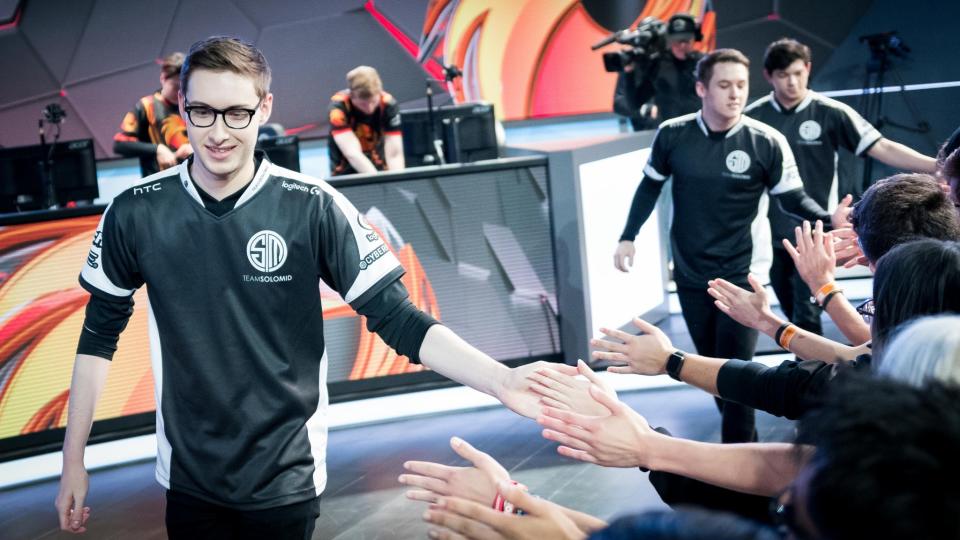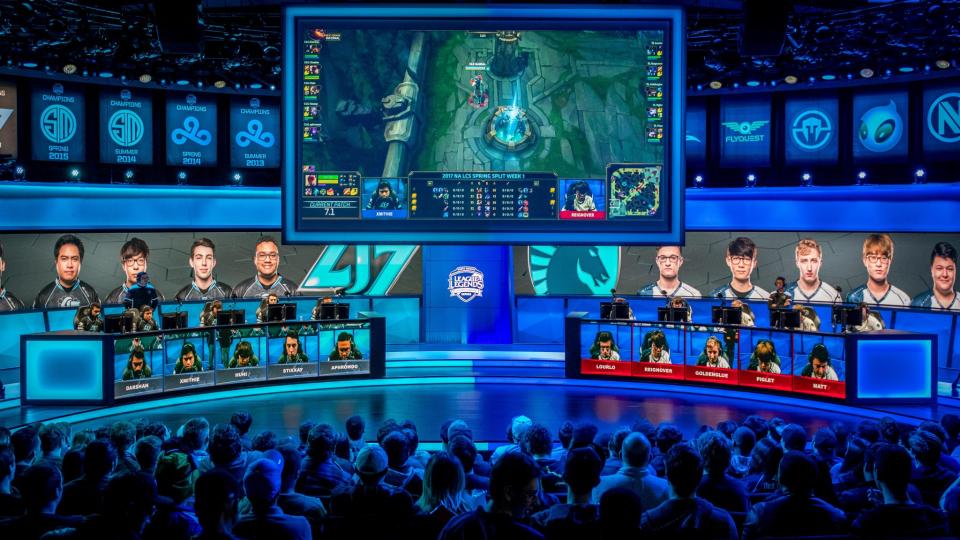Riot Games, Immortals CEO, and TSM owner discuss $10 million buy-in for NA LCS permanent partnership
This morning, Riot Games announced that they would be implementing a “permanent partnership” system for the NA LCS starting with the 2018 season.
You can read up on the full changes, but in short, the system will effectively create (mostly) permanent placements within the league, with revenue sharing between teams, Riot Games, and players. The system will also allow for funding to create a Player’s Association to further protect those who take their skills to the Rift.
In order to get the full details of exactly how permanent partnership will work, Yahoo Esports’ Travis Gafford sat down with co-head of esports at Riot Games Whalen Rozelle and co-head of esports and head of merchandising Jarred Kennedy, as well as Team SoloMid owner Andy “Reginald” Dinh and Immortals owner Noah Whinston to discuss the future of franchising.
Getting things started
Selecting teams to take permanent places within the NA LCS will be a difficult process. As such, Riot Games has set up a selection process that it has deemed both fair to everyone and gives the highest chance of success for the League as a whole.
To start, there’s going to be a buy-in.
“We’re not looking to do a bidding process,” said Kennedy. “We’re looking to establish a flat fee. That flat fee will be $10 million. The reason that we’re doing this in this way is we’re not optimizing for the highest dollar. We’re not looking for mercenaries who can pay the highest price and therefore have the highest ability to extract dollars from our fans or our scene and get a return on that investment. What we want to do is use this process to find the right set of partners who are going to build this league with us.”
That $10 million will be used not just as part of the vetting process, but a way to fund several services that the new league will provide, including the Player’s Association (which will be discussed later).
Rozelle is aware that the price point may seem high at first glance.
“We’re actually going to structure the payment so it’s even a bit easier to get in,” he said. It’ll be half up front, and the rest will be deferred. The goal is not to create a barrier that is so high that a team that should be in the league can’t get into [it],” he said.
With the revenue sharing breaking down to “roughly” (according to Rozelle) one third of league’s revenue going to Riot, teams, and players respectively, Rozelle knows that there will be be people looking at the NA LCS as a money-making opportunity. However, he believes that the best way forward is focus on creating the best LCS possible, rather than aim to make a quick buck.
“We put more weight on the ability to field a great team, take care of the pros, build long-lasting connections. At the end of the day, having a great fanbase and putting out a product on the Rift that fans love to see and connecting those fans with stars, that’s the core of what a sports league is all about. We certainly value the idea of potentially someone who could…dramatically grow the pie, because we think that’ll be good for everyone. If we had to choose one or the other, I think we’d weigh towards, ‘How can the NA LCS be as competitive as possible,’ because that’s the goal here.”

Making an investment
Entering into a long-term partnership is always a risk, something that Whinston and Dinh are fully aware of. But with the promise of a return on their money on the horizon, the pair are optimistic about the future.
“A lot of people will sometimes misinterpret this kind of franchise fee as a price of a ticket to get in the door,” Whinston said. “From my perspective, I interpret it as a cost to build a factory. This is a capital cost. You’re investing in something that will then return value to you, not just qualitative value, but quantitative value. You’re going to get paid for being a part of the league. It makes sense to pay money up front in order to access that.”
Rozelle is also cognizant of the risk team owners are taking when investing in the NA LCS. He said, “We do think this investment is non-trivial, but at the same point, we think this is an investment that can begin paying off pretty quickly. We want that to be the case. Being a part of the LCS should be a very positive thing that encourages people to want to double down on it.”
To give team owners more reason to “double down” on their commitment to the NA LCS, the revenue sharing agreement will incentivize results. The better teams do in the league, the more money they will make.
“If you win more, you actually get more money to spend,” said Rozelle. “It’s another function of the rev share for teams. Essentially, there are ten slices that [teams] get of escalating size. If you finish first, you actually get a slightly larger share than second, second larger than third, etc. That’s meant to speak to the competitive concerns going into franchising and ensuring that teams are incentivized to win, not just on the Rift but off.”
Removing the chaff
Of course, if teams are unable to live up to the expectations set for them, removal from the partnership may become necessary.
While removal from the NA LCS has previously resulted in controversy (see: the Renegades/TDK/Team Impulse situation), Riot will be retaining the ability to force owners to sell their spots.
Kennedy said, “To be clear, we’re not looking to have a backdoor to remove people at a whim. We’ve already actually implemented, in the current system, arbitration to prevent things like that from happening. But we do want to make sure that if we accidentally get a bad actor into the partnership group, that there are ways to address that… Bad actors can take many forms. They can just be doing dishonest things, just not trying, not making investment and assuming that they’re going to take their share of the revenue without putting any investment forward.”
While relegation will be a thing of the past under the permanent partnership system, there will be a process in place to remove teams that consistently underperform, according to Rozelle.
“If [a team] consistently loses over the course of multiple splits, over a string of years, at that point, we’ll have them sell their organization and let another ownership group take a crack at owning the team.”

The Player’s Association
While much of the discussion around franchising has been centered around the relationship between team owners and Riot Games, there is a third piece of the puzzle: The players.
Under the new system, players will be getting “roughly” one-third of the revenue generated by the league, as well as the protection of a Player’s Association, consisting of both player representatives and constituents in place to help represent them in any arbitration necessary.
To help create the Association, Riot has vetted a group of professionals (including some law firms) for players to look through and decide on who will counsel them going forward. In the future, there will be an election process to decide on which players will represent the Association in decision-making processes.
While the fact that Riot has selected the potential player counsel may raise eyebrows, Kennedy assured us that it was just to help move things in the right direction.
“We’re looking to help them find counsel… Separate from that, there will be an election of player representatives… What we’re trying to do is make sure that, when they’re starting the process, they’re getting good advice and can structure their association a way that makes sense and evolve the way it needs to evolve.”
Dinh believes the new Association will be beneficial to both players and team owners, despite the fact that there will be a new step in negotiation between him and his contracted players.
“I’m actually overall excited that this is happening. When you’re entering a negotiation with players, things are are generally unclear. Now that they’re getting a piece of the pie and it’s a straight percentage, they’re able to see what they’re getting. It’s going to make it a lot easier versus a system where you’re just going to aim for the highest and there’s no way to quantify what you’re worth. Also talking to someone with experience who is also vetting and reviewing your legal documents is going to be much easier too. Often, these players don’t understand what they’re signing. If the expectation isn’t set from both sides, then it’s not a good partnership in the long run anyway. When expectations are set and players know exactly what they’re signing, it creates a partnership that can be really long-lasting.
It’s been up to the owners to look after the players. Making sure we provide health care, making sure we’re helping them review their agreements. Now, I think we can do so much more for them and prepare them for a proper future after their career.”

Looking to the future
Both Riot and the team owners believe this is the right way forward for the NA LCS. However, no one thinks this is an end-all, be-all solution to all of the league’s problems.
Said Whinston, “Nobody should look at this permanent partnership process and say, ‘Look, as the end of 2017 rolls around, all the problems are solved, no one needs to do any work anymore, the cash just rolls in for everybody.’ We’re getting married to Riot [laughs]. Your work on a relationship doesn’t stop when you get married. You need to continue to put effort into it, you need to continue to invest into it. And you need to continue to develop what that relationship looks like over the long term.
“Does this have everything have everything we could conceivably want year one? No. Does it have a lot of things we want and the potential to get more of what we want as time goes on? Absolutely.”
Added Dinh, “I think it’s a huge step in the right direction, ultimately because every party’s going to have more transparency into how we operate the business… As long as our goals are aligned, we’ll be able to get it right through time.”
Follow Taylor Cocke on Twitter @taylorcocke.


